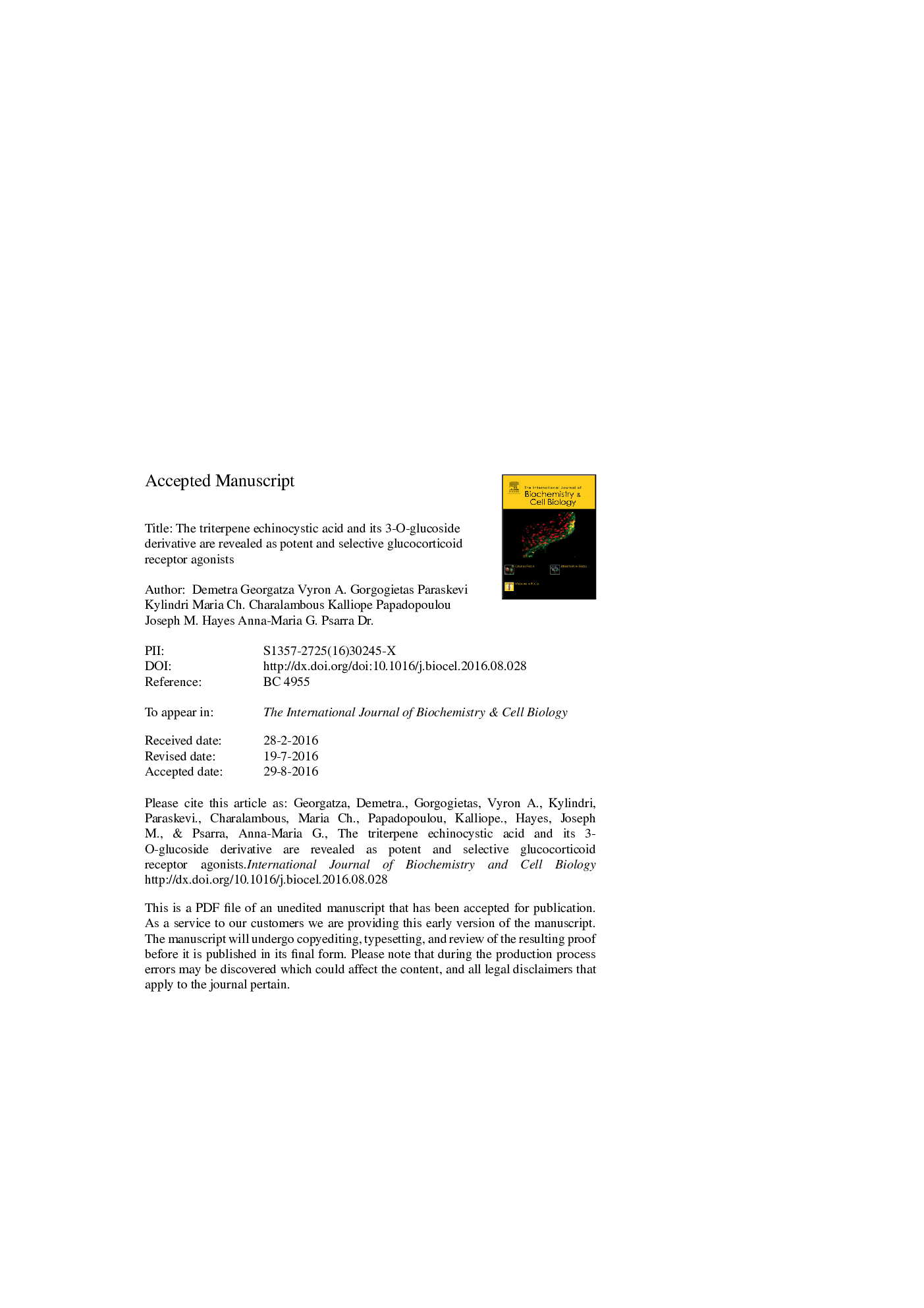| کد مقاله | کد نشریه | سال انتشار | مقاله انگلیسی | نسخه تمام متن |
|---|---|---|---|---|
| 8322281 | 1539864 | 2016 | 48 صفحه PDF | دانلود رایگان |
عنوان انگلیسی مقاله ISI
The triterpene echinocystic acid and its 3-O-glucoside derivative are revealed as potent and selective glucocorticoid receptor agonists
دانلود مقاله + سفارش ترجمه
دانلود مقاله ISI انگلیسی
رایگان برای ایرانیان
کلمات کلیدی
NF-κβRLUGCsIFDPEPCKDACSEGRATNF αCMXiNOSInduced-fit dockingLBDCRHDEXNF-κBEchinocystic acid - اسید اکینوسیستیکchromatin immunoprecipitation - ایمن سازی کروماتینtumour necrosis factor alpha - تومور نکروز عامل آلفاApoptosis - خزان یاختهایligand binding domain - دامنه اتصال لیگاندDexamethasone - دگزامتازونinducible nitric oxide synthase - سنتاز اکسید نیتریک القاییgres - ظروف سفالین سنگ نماglucocorticoid responsive elements - عناصر پاسخگو گلوکوکورتیکوئیدnuclear factor kappa beta - فاکتور هسته ای کاپا بتاphosphoenolpyruvate carboxykinase - فسفوآنولپیرود کربوکسیکینازHPA - میلی بار یا هکتوپاسکالcorticotropin-releasing hormone - هورمون آزاد کننده کورتیکوتروپینhypothalamic–pituitary–adrenal - هیپوتالاموس-هیپوفیز-آدرنالrelative luciferase units - واحد لوسیفراز نسبیCHiP - چیپGlucocorticoids - گلوکوکورتیکوئیدهاglucocorticoid receptor - گیرنده گلوکوکورتیکوئید
موضوعات مرتبط
علوم زیستی و بیوفناوری
بیوشیمی، ژنتیک و زیست شناسی مولکولی
زیست شیمی
پیش نمایش صفحه اول مقاله

چکیده انگلیسی
Glucocorticoids are steroid hormones widely used to control many inflammatory conditions. These effects are primarily attributed to glucocorticoid receptor transrepressional activities but with concomitant receptor transactivation associated with considerable side effects. Accordingly, there is an immediate need for selective glucocorticoid receptor agonists able to dissociate transactivation from transrepression. Triterpenoids have structural similarities with glucocorticoids and exhibit anti-inflammatory and apoptotic activities via mechanisms that are not well-defined. In this study, we examined whether echinocystic acid and its 3-O-glucoside derivative act, at least in part, through the regulation of glucocorticoid receptor and whether they can constitute selective receptor activators. We showed that echinocystic acid and its glucoside induced glucocorticoid receptor nuclear translocation by 75% and 55%. They suppressed the nuclear factor-kappa beta transcriptional activity by 20% and 70%, respectively, whereas they have no glucocorticoid receptor transactivation capability and stimulatory effect on the expression of the phosphoenolopyruvate carboxykinase target gene in HeLa cells. Interestingly, their suppressive effect is diminished in glucocorticoid receptor low level COS-7 cells, verifying the receptor involvement in this process. Induced fit docking calculations predicted favorable binding in the ligand binding domain and structural characteristics which can be considered consistent with the experimental observations. Further, glucocorticoids exert apoptotic activities; we have demonstrated here that the echinocystic acids in combination with the synthetic glucocorticoid, dexamethasone, induce apoptosis. Taken together, our results indicate that echinocystic acids are potent glucocorticoid receptor regulators with selective transrepressional activities (dissociated from transactivation), highlighting the potential of echinocystic acid derivatives as more promising treatments for inflammatory conditions.
ناشر
Database: Elsevier - ScienceDirect (ساینس دایرکت)
Journal: The International Journal of Biochemistry & Cell Biology - Volume 79, October 2016, Pages 277-287
Journal: The International Journal of Biochemistry & Cell Biology - Volume 79, October 2016, Pages 277-287
نویسندگان
Demetra Georgatza, Vyron A. Gorgogietas, Paraskevi Kylindri, Maria Ch. Charalambous, Kalliope K. Papadopoulou, Joseph M. Hayes, Anna-Maria G. Psarra,